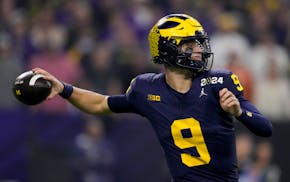When the "Love Boat" scandal sent reputation-destroying shrapnel flying around the Vikings locker room, owner Zygi Wilf commissioned an exhaustive code of conduct.
Wilf missed the days of Onterrio Smith and his Whizzinator, and Keith Millard telling cops that his arms were more powerful than their guns, and the drug-smuggling allegations aimed at Donald Igwebuike. Wilf had yet to deal with Brett Favre playing a "Monday Night Football" game in the New York area as tabloids reported on his alleged harassment of Jenn Sterger.
Until the Love Boat scandal, Wilf probably had no idea that an NFL locker room could be a cesspool.
Now, he knows what everyone who has worked in an NFL locker room knows: If any team was legally forced to reveal what is said behind the scenes, that team would be embarrassed.
I won't take a side in the Vikings' legal battle with Chris Kluwe, because I couldn't stand to be aligned with either.
In one corner stands a former punter who claims the Vikings released him because of his activism. He's wrong. The Vikings cut him because punters who become a pain in the rear while making more than a million dollars a year always will get cut, as will punters whose performance declines.
Kluwe's stated goals are admirable. We should applaud his efforts to eradicate homophobia and religious intolerance. But the same man who claimed to be offended by special teams coach Mike Priefer's homophobic statements made light of child rape.
In the other corner stands an organization that has lightly punished Priefer, with a three-game suspension that could be shortened to two games, and a $100,000 gift to gay, lesbian and transgender charities. A hundred grand? The Vikings spend that much on cortisone.
Because NFL locker rooms always have been bastions of simple-mindedness, Priefer felt comfortable expressing his homophobia, and Kluwe felt comfortable mimicking a child rape victim.
Because immaturity expressed in the form of hate speech is so common in the NFL, the Vikings reacted with politically correct statements, then levied minor penalties, as if to say, "Nothing to see here, move along."
I've been covering the NFL, off and on, since 1989. I've heard more offensive comments and witnessed more abusive behavior in the hundreds of hours I've spent in NFL locker rooms than I have in the rest of my life.
It's not as bad as it once was, because there are so many cameras and recorders during media access periods these days that players can't get away with hate speech as easily today as they once could.
In the early 1990s, I was threatened by NFL players — not that I took the threats seriously. Randy Moss once opened the door to the media room and called all present a gay slur. (I include Moss' name, and not the names of other players who have said offensive things in my presence, because Moss said it to a group of reporters, and that comment has become part of the Winter Park folklore.)
Another former player once asked a reporter, after a flamboyantly dressed writer from Sports Illustrated left the locker room, "Who's the …" followed by a version of the same slur Moss used.
Neither I nor other reporters made a fuss about those interactions because many of us considered verbal abuse to be part of the job. NFL players are large, sometimes violent men who might take mood-altering, performance-enhancing drugs, and might be affected by brain trauma. You don't go into an NFL locker room expecting poetry.
You can find exceptional human beings in the NFL about as often as you can find exceptional human beings in any other workplace, but a valued player can get away with bad behavior if he contributes on the field.
Kluwe wasn't valued, and had stopped producing at a level commensurate with his salary. He deserved to be cut.
What's sad is that Kluwe's campaign against the Vikings would be worthwhile if he hadn't adopted the same behavior he now condemns.
Jim Souhan can be heard weekdays at noon and Sundays from 10 to noon on 1500 ESPN. Twitter: @SouhanStrib jsouhan@startribune.com
Souhan: Wolves deserve better challenge than soft, shallow Suns

Souhan: These seven plays showcase Wolves' new defensive fire

Souhan: Wolves fans made Game 1 special. Now bring on Game 2.

Souhan: Should Vikings even consider McCarthy in NFL draft?


